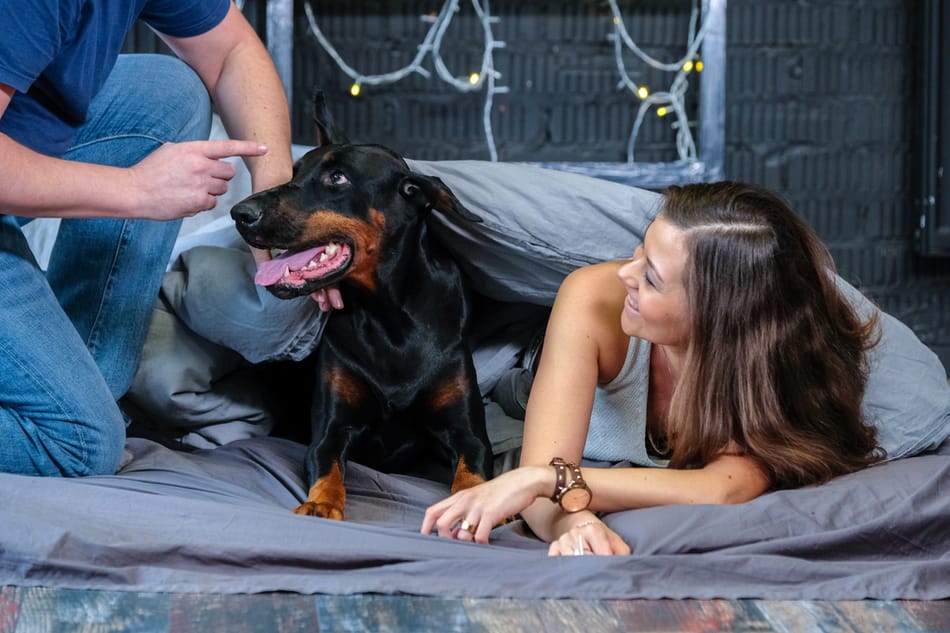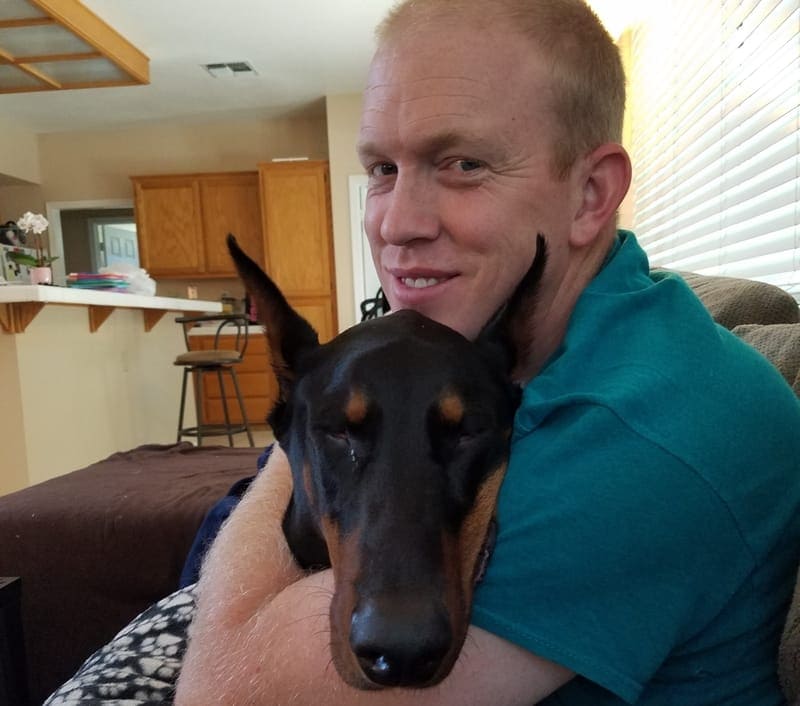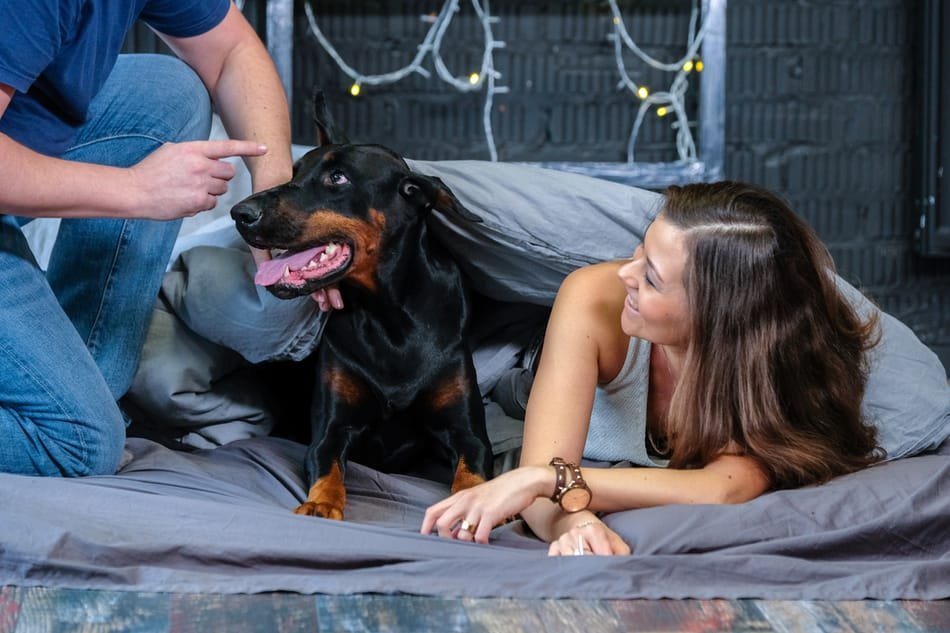Have you ever wondered why your Doberman is so clingy? It can be quite surprising to see how attached these dogs can become to their owners. They often follow their humans around, seeking constant attention and affection. But what drives this behavior? Why are Dobermans particularly inclined to be clingy?
To understand why Dobermans can be clingy, we must look at their history and natural instincts. Originally bred as guard dogs, Dobermans were trained to be highly loyal and devoted to their owners. This strong bond was necessary for them to carry out their protective duties effectively. Over generations, this instinctual attachment has become a defining trait of the breed, making Dobermans naturally prone to clinginess. Despite their imposing appearance, they are often sensitive dogs that crave love and attention.
A Doberman may become clingy due to several reasons, including separation anxiety, lack of socialization, or a need for attention. To address this behavior, make sure your Doberman gets plenty of exercise, mental stimulation, and social interaction. Establish a consistent routine and provide a safe space where your dog feels comfortable. Consider seeking professional help if the clinginess persists. Remember, understanding your dog’s needs and providing a balanced lifestyle can help reduce clinginess.

Why is My Doberman So Clingy?
Dobermans are known for their loyalty and protective nature, but sometimes they can take it to the extreme by becoming overly clingy. If you find that your Doberman is constantly following you around, seeking constant attention, and becoming anxious when you’re not with them, you may wonder why they are so clingy. In this article, we will explore the possible reasons behind this behavior and provide insights into how to manage it.
1. Separation Anxiety
One of the most common reasons why Dobermans can be clingy is separation anxiety. Dobermans are highly affectionate and form strong bonds with their owners. When left alone, they may experience extreme distress and anxiety, leading to clingy behavior when you are present. This anxiety can manifest as excessive barking, destructive behavior, and even physical symptoms like drooling or pacing.
To help manage separation anxiety, it’s important to gradually desensitize your Doberman to being alone. Start by leaving them alone for short periods and gradually increase the duration over time. Provide them with interactive toys or puzzle feeders to keep them occupied. It may also be beneficial to consult with a professional dog trainer or behaviorist for additional guidance.
2. Lack of Exercise
Dobermans are an energetic and active breed that requires plenty of physical exercise and mental stimulation. If your Doberman is not getting enough exercise, they may become clingy as a way to seek attention and release pent-up energy. Without an outlet for their energy, they may resort to attention-seeking behaviors.
To address this issue, make sure to provide your Doberman with regular exercise sessions. Daily walks, playtime, and interactive toys can help keep them physically and mentally stimulated. Consider engaging them in activities such as obedience training or agility to provide mental challenges and tire them out.
3. Lack of Socialization
Proper socialization is crucial for Dobermans to develop into well-rounded dogs. If a Doberman has not been adequately socialized during their formative months, they may develop clingy behavior due to anxiety or fear in new situations or around unfamiliar people. They may rely heavily on the presence of their owner for comfort and security.
To address this issue, expose your Doberman to a variety of people, animals, and environments from a young age. Positive reinforcement training and gradual introductions to new experiences can help build their confidence and reduce clingy behavior. If necessary, consult with a professional dog trainer or behaviorist for assistance with socialization techniques.
4. Health Issues
Sometimes, clingy behavior in Dobermans can be indicative of underlying health issues. Certain medical conditions or discomfort may cause them to seek constant attention and closeness. If your Doberman has suddenly become clingy and there are no apparent changes in their environment or routine, it’s advisable to consult with a veterinarian to rule out any medical issues.
Regular veterinary check-ups and maintaining their overall health and well-being are important for ensuring a happy and balanced Doberman.
5. Lack of Training or Structure
Dobermans thrive on structure and clear boundaries. Without proper training or consistent rules, they may become clingy as a way to seek reassurance and guidance. If they are unsure of their role or boundaries within the household, they may constantly seek your presence for guidance and security.
Developing a training routine and providing consistent boundaries can help address clingy behavior. Positive reinforcement training methods can be highly effective in teaching your Doberman appropriate behavior and building their confidence.
Understanding Your Clingy Doberman
While the clingy behavior of Dobermans can be challenging to deal with at times, it’s important to approach them with empathy and understanding. Remember that their clinginess is often a reflection of their deep bond and loyalty to you as their owner.
By addressing the underlying causes of their clingy behavior, providing them with appropriate outlets for their energy, and ensuring their overall well-being, you can help your Doberman feel more secure and confident. With time, patience, and consistent training, you can create a balanced and harmonious relationship with your beloved Doberman.
Key Takeaways: Why is My Doberman So Clingy?
- Dobermans are naturally loyal and affectionate dogs.
- Clinginess in Dobermans can be a sign of separation anxiety or insecurity.
- Early socialization and training can help reduce clingy behavior in Dobermans.
- Providing mental and physical stimulation can help keep your Doberman entertained and less clingy.
- Consistency and positive reinforcement are essential in addressing clinginess in Dobermans.
Frequently Asked Questions
Doberman Pinschers are known for their loyalty and strong bond with their owners. However, some Dobermans may exhibit clingy behavior, constantly seeking attention and companionship. If you’re wondering why your Doberman is so clingy, here are some frequently asked questions and answers that may help you understand their behavior.
1. Why does my Doberman follow me everywhere I go?
Dobermans are highly social dogs that thrive on human companionship. They have a strong desire to be close to their owners, which can often result in following you around the house. This clingy behavior is a manifestation of their loyalty and their need for constant attention and interaction. Additionally, Dobermans have a naturally protective instinct, and by staying close to you, they feel like they are fulfilling their role as a guardian.
If you find your Doberman’s constant presence overwhelming, it’s important to establish boundaries and teach them to be comfortable alone for short periods. Gradually increasing the time apart and providing mental and physical stimulation can help alleviate their clinginess.
2. What causes separation anxiety in Dobermans?
Separation anxiety is a common issue among Dobermans, leading to clingy behavior when left alone. This anxiety typically stems from a fear of abandonment and a deep attachment to their owners. It can develop due to various reasons, such as sudden changes in routine, being left alone for extended periods, or previous traumatic experiences.
To help your Doberman overcome separation anxiety, it’s crucial to gradually desensitize them to your departures. Start by leaving for short intervals and gradually increase the time spent apart. Creating a positive association with your departures, such as giving them a treat or a special toy when you leave, can also help alleviate their anxiety.
3. Can clingy behavior be a sign of health issues?
In some cases, excessive clinginess in Dobermans can be a red flag for underlying health problems. It’s essential to rule out any physical discomfort or medical conditions that may be causing their clingy behavior. Common health issues that can lead to clinginess include pain, hormonal imbalances, or neurological disorders.
If your Doberman’s clinginess is accompanied by other concerning symptoms, such as appetite changes, lethargy, or aggression, it’s advisable to consult with a veterinarian to rule out any underlying health issues.
4. Can training help reduce clingy behavior in Dobermans?
Training plays a vital role in curbing clingy behavior in Dobermans. Teaching them basic obedience commands, such as “sit,” “stay,” and “down,” can help establish boundaries and redirect their attention when they become overly clingy. Engaging in regular training sessions also provides mental stimulation, which can alleviate their need for constant attention.
Consistency and positive reinforcement are key when training Dobermans. Rewarding them with treats or praise for desired behavior and ignoring clingy behavior can help shape their actions. It’s important to remember that training takes time and patience, but with a consistent approach, you can help reduce their clingy tendencies.
5. Are there any other factors that contribute to clingy behavior in Dobermans?
Aside from their natural inclination for companionship, several factors can contribute to clingy behavior in Dobermans. Changes in their environment, such as moving to a new home or the addition of a new family member, can trigger clinginess as they seek reassurance and familiarity.
Lack of mental and physical stimulation can also lead to clinginess in Dobermans. Ensuring they have regular exercise, interactive toys, and opportunities to socialize with other dogs can help keep them mentally and physically engaged, reducing clingy behavior.

Dobermans can be naturally clingy due to their strong loyalty and attachment to their owners.
This behavior can be further influenced by factors such as separation anxiety, lack of mental stimulation, or a need for physical affection.
It’s important to provide a structured routine, engage in regular exercise and training, and offer plenty of love and attention to help address clinginess in your Doberman.
Remember to consult with a professional dog trainer or behaviorist if the clinginess becomes excessive or starts impacting your daily life.
